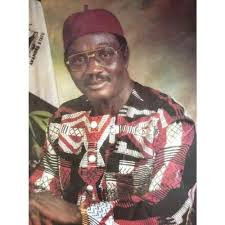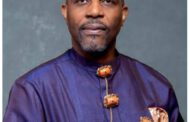Mazi Omife I. Omife
The first time I saw C. C. Onoh in my life was early 1979 when he came to Awka on a political rally during his campaign for the governorship of then Anambra State under NPN, to formally present his running mate, Chief Barrister Ozoemena Onyali, now SAN.
A particular episode at that rally has never escaped my memory since then. At a point during his speech, C. C. Onoh had referred to Anambra South, as the present Anambra State was referred to then, as Agbenu. Immediately, Chief Barrister N. N. Anah took the microphone and corrected C. C. by explaining that the people of Anambra South do not regard Awka and environ as Agbenu but only people from Orumba and Aguata areas.
But Onoh would not take that correction. He took over the microphone and said that as far as he was concerned, he has said his mind, and that when he leaves Awka, “you people can call yourselves whatever and however you wish”. Thunderous laughter. But that was C. C. Onoh for you. No courtesy of words or language when expressing his mind.
The next time I met C. C. Onoh on close interaction was in 1983 when he was again vying for the governorship of old Anambra State, having lost the election in 1979 to Jim Nwobodo. I had gone to see Onoh as the Chief servant of the Federation of Nigerian Youths (FONY), with one of my members, Emma Muotanya. We had gone to see C. C. in his Ngwo palace to discuss how FONY can help him in his campaign.
It was in the course of our discussion that I discovered that Onoh was a totally different person from the picture people painted of him as a sectional and greedy person. When he learnt that I was from Mbaukwu in then Anambra South, he became more friendly and began to tell stories of his passionate relationship with many Agbenu people, but not without accusing my people in government of oppressing his own people.
I discovered that the man was a very clean person whose only “crime” was that he hated injustice in any form no matter by who against who and always fought against injustice wherever it was, whether for an individual or group or whatever, saying that was one of the reasons he was vying for the governorship of Anambra State, to stop the injustice being done against the Agbenu people under Jim Nwobodo government such as revoking their lands and other injustices. I was dumb founded and so too was my friend, Emma Mortanya.
It was also during our discussion that I discovered that Onoh was one of the greatest philanthropists Nigeria had ever produced and most of his beneficiaries were not from his Wawa area, many of them from Anambra South and others from other regions of the country. Where it was not direct financial assistance running into millions of naira for business start-up or other reasons, it was in the form of rescuing victims of injustice in the hands of government, police, military or the private sector.
I personally witnessed part of Onoh’s uncommon magnanimity when I was living in Abakpa Enugu. One of the masons from Neni in Anaocha LGA of Anambra State, Chief Momah who had worked for Onoh had been working for Aninefungwu for years and just finished plastering a two-storey building for Onoh. The day Onoh came to inspect the house, after the inspection, he turned to the man and told him he has dashed the house to him. I was living two houses from the building then.
I also marveled at Onoh’s simplicity of life. He had no protocols whatsoever in the way he receives visitors. You didn’t have to fill any form or ask an attendant to take a note to him. Immediately we arrived, his attendant (we met no other attendant throughout our two hours stay), after asking who we were, immediately went in to inform him we were around without asking whether we had an appointment with him as happens in most other big homes.
Another time I met Onoh was around 1995 during Abacha regime, when my friend and boss, Alhaji Mamman Uwais wanted to float a new political party along with his friends including Barrister Flora Olatunji and Alhaji Ibraim Dambata and we visited him to request for his support and blessing.
At our arrival, Onoh was not in the house. On inquiry, we were informed that he was at the nearby Eke-Ani market and that he left an instruction that anybody who came to see him should be directed to the place.
On arrival at the village square, we made further inquiries and we were directed to the place we could see him. We could not believe our eyes and ears as Onoh sat with a dozen or so of his elderly kinsmen gulping palm wine and cracking jokes on one another and laughing derisively as if they had no worries in the world.
When he saw us, he instinctively knew we were looking for him and he quickly beckoned on us to sit down and join them, promising not to take too much of our time. We happily obliged, stunned as we were by the unimaginable simplicity of a man regarded outside as the lion of the tribe of Wawa land, nay Igbo land. The rest is now history.
This brings me to a reminiscence of the epic roles played by C. C. Onoh in the history of Wawa people and their rise from a despised and derided race to one of the most respected and revered ethnic nationalities in Nigeria today. It was all the making of Aninefungwu, the Okaa Ome I of Ngwo clan. C. C. Onoh’s crusade for the emancipation of Wawa people took many forms and many frontiers of battle.
And he accomplished it the day Enugu (Wawa) State was created on August 27th, 1991, the day Onoh sasng his own version of Nunc Dimittis before a massive and jubilant crowd of Wawa people who thronged his Ngwo palace to pay him homage on hearing the announcement of the creation of Enugu State on the network news.
I remember far back in the late 70’s when I was a student at Christ High School, Abor, in Udi local government area; there was this popular and viral derogatory translation of the acronym WAWA as West African Worst Area.
At a time, C. C. Onoh published a book in which he debunked the translation with facts and figures including the historic encounter between Chief Onyeama n’Eke and the then Obi of Onitsha, Obi Okosi, the supreme ruler of Onitsha in Enugu in 1928 when Onyeama, with his warriors, chased him out of the royal seat during a meeting with the Colonial administrator, declaring himself the king of Enugu land. At the end, Onoh put the records right by saying that the true translation of WAWA was West Africa’s Wisest Area. Can you beat that?
By his idiosyncrasies, Onoh succeeded in erasing the sense of stigma and shame that used to haunt Wawa people. For instance, time was when “Okpa”, one of the most popular wawa food snack was derogatively referred to as Okpa wawa” by non-Wawa’s. Onoh helped to stop it by publicly eating okpa anywhere, any tine he had opportunity.
Other wawa people took a cue from him and soon, okpa rose to such popularity and prominence that even non-wawa residents eventually overtook wawa people in chopping the delicacy. The same with Onoh’s local language. He never spoke any other dialect other than his Ngwo dialect, until he died. Which again encouraged other wawa people to speak their local dialects anywhere without shame.
Then again, Onoh, in all his life, never lived in Enugu even though he owned a fleet of houses in all parts of Enugu. He lived in his ancestral home Ngwo from where he shuttled to Enugu for every business he had to do.All dignitaries that needed to visit or see him, including military and civilian heads of State and other top government functionaries and politicians came to see him at Ngwo. This was how Onoh put Ngwo and by extension, wawa land, on the world map.
These may be on a humorous note. But the humorous episodes typified his more heroic and epic interventions on behalf of Wawa people, much of the time single handedly and at his own personal expenses, engaging the powers that be whenever he perceived that Wawa people were being mistreated or denied equity and fairness.
It was with this patriotic mission that he engaged military governors like late Air Commodore Sampson Omeruah and Col. Robert Akonobi (Rtd) both as former military governors of the old Anambra State. It was also with the same zeal and ferocity that he and other wawa compatriots fought some timbers and calibers from the other side of old Anambra State who tried to frustrate the creation of Wawa State for many years.
It is on record that during the creation of new states in 1976, Onoh and his wawa kinsmen had spent weeks in Lagos shuttling to and from Dodan Barracks canvassing for the creation of Wawa State and had receive assurance from military junta that a decision had been taken by the military government to create a total of 20 States including Wawa State.
As the jubilant crew travelled back to Enugu the following day, singing and whistling for joy in the car, the announcement of newly created states came through network news, and lo and behold, wawa state was not announced. The list had been changed at the very last moment, reportedly following a powerful representation by a group of people from the other side who convinced the military junta that Onoh as governor of Wawa State, would sieze the property belonging to non-Wawas, especially the Agbenu people as happened in Port-Harcourt after the war.
Ironically, it was the same Onoh who returned the lands belonging to Anambra South people which was revoked by the Jim Nwobodo administration back to the owners as soon as Onoh became governor in 1983.
As devastating as the shock was to Onoh and wawa leaders, that only worked to re-energize Onoh for a battle for another day, which came through 1991, 27th August. The day Onoh declared that he was ready to die, having lived to see the liberation of his people from domination and oppression, a perennial complaint from Onoh that became so glaring after the creation of Enugu State which left the new Enugu State civil service almost crumbling because virtually all the senior positions were occupied by people from the other side, leaving wawa people predominantly in the junior cadre. Which, in fairness, was deplorable.
What is amazing is that after all epic battles fought and won by C.C. Onoh for wawa people, up till today, I cannot remember any way the government and people of Enugu and Ebonyi States have deemed it proper to give him a befitting honour.
Not even by naming the smallest structure or institutions after him, in spite of the numerous institutions rising up in the State on daily basis, and when every Tom, Dick and Harry and every town in Igboland have a street or lane or whatever named after them, including my humble self, in many cases, for no particular record of achievement, although in my own case, it was a public appreciation of my youthful political activism in the 80’s in Enugu that I was privileged to have a bus stop, Omife bus stop along Obiagu road, named after me and another one at Abakpa Nike named Omifeoma lane. How much more of a man who virtually spent his life from his youth fighting for the cause of Wawa people until his demise.
Even in death, the governments of Enugu and Ebonyi States failed to live up to people’s expectation of giving their hero a befitting State burial, and not even the Federal government that gave him a state burial. Onoh was just buried like an unknown soldier.
One had expected the two governments to declare a public holiday in his honour an even fly the Nigerian flag at half-mast to bid this lion of a defender farewell. The only known vestige of the late sage, if it can be called one, is the Onoh quarters, itself a fading reference, which was at the instance of the Enugu public, not government, in reference to Onoh’s personal estate at the Ekulu area of Enugu. Yet, here was a man who demonstrated peculiar love for all the sections of Wawa people that include the present Ebonyi State.
Recall when Jim Nwobodo was jailed by the General Mukatar Mohammed-(Rtd) led panel on recovery of public property. It is said that at a time the recovery panel put up Jim’s property for sale to recover money he was alleged to have looted, Onoh quickly bought those property which he later handed back to Jim on his return from prison.
Recall also the day Enugu State was created when over two thousand Wawa people of both high and low gathered at Onoh’s palace a6tht Ngwo. In the course of his speeches, he insisted that the people of Nsukka would take the first shot at the governorship of the new Enugu State, when most people had reasoned that he himself would want to be the first governor in deference to his leading role in the creation of the new State, or if not himself, somebody from Udi-Ezeagu area, who had been the leading zone in both educational, political and economic affairs of Wawa land.
But Onoh insisted that justice and equity favoured Nsukka people. And so it happened that Dr. Okwesilieze Nwodo from Nsukka became the first civilian governor of Enugu State, comprising the present Ebonyi State.
Then what crime has Onoh committed against successive governors of Enugu and Ebonyi States and their Ohaneze leaders that they should so treat him with such contempt and ignominy? Could it be a coincidence of oversight? I would rather believe so.
And if it is an oversight, that oversight must be redressed as a matter of urgency. I speak for myself.
Mazi Omife Omife is the Mbuze Mbaukwu













